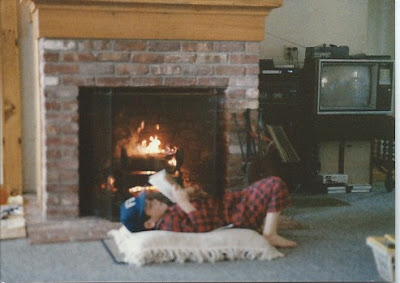 |
| Carrying Ryan in his backpack |
I now belong to an exclusive club no one wants to join: parents who have lost a child. “I cannot imagine how you must feel,” say other parents not in the club. Neither could I before it happened but I knew it would be awful, and it is.
What happened wasn’t my worst fear, but close. I feared our son might die alone, and he didn’t. He lingered in the ICU for nine days. During the first five he was in and out of consciousness, knew all his loved ones were with him and had the Last Rites. There’s nothing for me to fear anymore, but sadness and grief have taken fear’s place. Those two will be with me, and my family, a long time I think.
I don’t know which is worse but fear had become familiar. Addiction is a terrible thing, debilitating for the addict, but also for his family and for everyone else who loves him. It’s a progressive disease and a fatal result was inevitable unless he could stop, and he couldn’t. Ten years ago I joined a 12-step group for families of alcoholics and it helped me cope, helped me live with the fear and anxiety. The program reduced but didn’t eliminate those two crippling emotions. Now there are two more with which to wrestle.
We buried our son’s body last week but I know his spirit survives, and I will see him again when my own body finally gives out. That knowledge is a comfort, and will it ultimately trump both sadness and grief. He passed peacefully, even if life offered little peace during his last years. He has eternal peace now. I know that, but sometimes I forget and have to remind myself that he’s in a better place.
As a columnist for twenty-two years, editors have tried to influence me to write more about this or that, but I’ve always written about what was most on my mind any given week — except my son’s addiction. Very often that was what I thought most about, but I’ve never written about it until now. Readers of the newspapers in which this column runs know my son died because his obituary appeared in their pages, but other readers around the country don’t know. Hence, this piece.
My wife and I are helping each other through this ordeal and I’m grateful to have her. Our children and our grandchildren help too. While we were sitting next to our son’s coffin tearfully listening to the priest’s homily, our four-year-old granddaughter, Lila, came into our pew to hold our hands and console us. She helped enormously. When days later I thanked her, she said: “Friends are supposed to help each other.”
Before Ryan died, we had been at the hospital more than a week consulting with doctors and other specialists. Most of another week was taken up with funeral arrangements. People in our church community and friends in the wider community were sympathetic and solicitous. Everyone in our immediate family gathered pictures to display at the reception in our church hall following the burial. Assembled pictures of Ryan were both endearing the heartbreaking to look at. People hugging me and expressing their condolences triggered more tears. It’s going to take a long time to wring them all out but, as my wife the therapist says, “If you can let it flow, you can let it go.” And that’s the goal, isn’t it? I have to let him go.
I’ve had some practice with that. I’ve had to let go of my obsession with his addiction. My program teaches the “Three Cs”: You didn’t cause it. You can’t control it. You can’t cure it. I had to love and support my son as he struggled for all those years. Thirteen times he went into treatment. He had stretches of sobriety lasting several months, but always slipped back. He was much harder on himself than we ever were on him, and now his struggles are over.
Knowing I won’t be able to talk with him anymore this side of heaven makes me miss him desperately. It’s going to be a while before that longing diminishes to bearable levels, but with God’s help, I’ll make it. When it gets hard I have to consider all the good things in my life, and there are many.








































